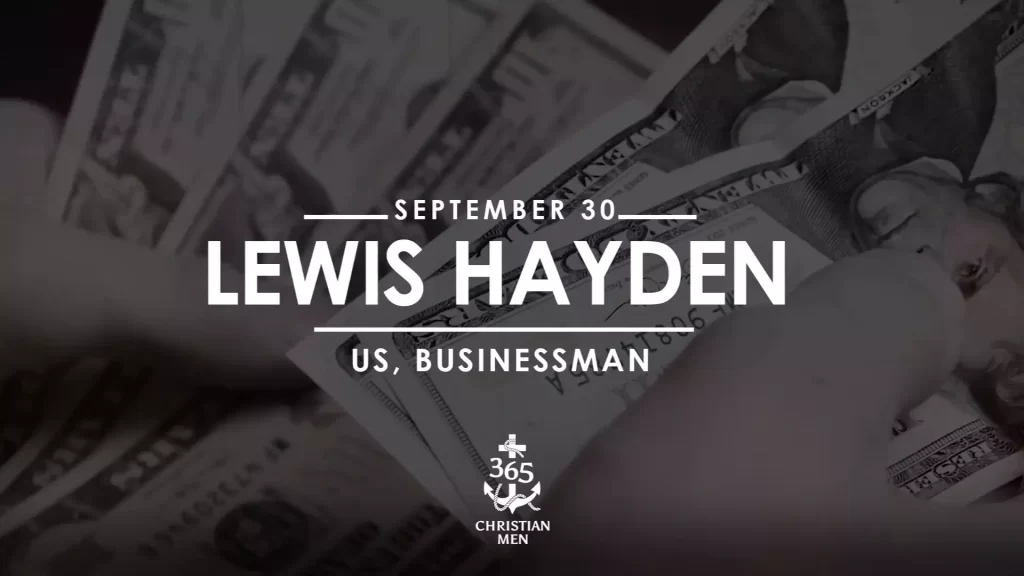September 30. Lewis Hayden. Lewis was born a slave, but no mistreatment or ugly label could hold him back. When he finally escaped slavery, he dedicated his life, his time, and his skill as a businessman to serve and support slaves and escaped slaves.
Lewis ran a clothing store, where he dressed runaway slaves—and he held meetings and campaigned against slavery. His home had a hidden tunnel connected to the Underground Railroad, a passageway to safety and freedom for escaped slaves.
At Lewis’s funeral, the pastor said about him, “The secret of the success in Lewis Hayden’s life is that he lived for others. He was, indeed, a prince among us.” On this day in 1850, Lewis became the chairman of The Friends of Liberty.
Circumstances can drag a man down, but God-given dignity can lift him up.
In 1811, Lewis was born a slave to a family of twenty-five in Lexington, Kentucky. Not an ideal situation. While he had family members all around him, life for a child slave was not safe.
Lewis was property, like a dog or a hamster is property. If slave children were disobedient or showed any kind of free spirit at all, they could be beaten just like adult slaves. Their owners did not see them as human beings. Just things to be used.
His father was sold off first. And Lewis knew that at any time he could be sold too, or his mother, or his siblings. This molded Lewis’s firm belief that he was only worth what someone was willing to pay for him.
When Lewis was ten, it finally happened. His owner sold all of Lewis’s family to different slaveholders and traded Lewis to a traveling salesman for two horse carriages. In one swoop, Lewis lost his entire family. He was left alone, a young slave. Not much sense of self-worth after that, not much of anything to cling to.
But when he was fourteen, an American Revolutionary War soldier visited Kentucky, and one day as he strolled past, he tipped his hat to Lewis.
What to most would have been a simple nod, a smile, a gesture … to Lewis, it was as if a veil had been lifted from his eyes. Someone acknowledged him. Him. As if he were a human being. A person. Not a slave, not a piece of property, but a young man.
This sparked something human in Lewis. For the first time in his life, he recognized his own value. And not just that, but the value his Father in heaven had for him. He was of worth in God’s eyes. He clung to that.
Not that Lewis’s troubles magically disappeared—they didn’t—he was still a slave, but he was a slave who, with that simple acknowledgment, began to change. He now had a belief in himself as a man.
This stayed with him, and a few years later, he approached Lewis Baxter, an insurance office clerk, and Thomas Grant, an oil manufacturer, and asked if they would buy him and hire him to make money for them—and let him keep some of the earnings to eventually buy his own freedom.
The men accepted, and Lewis was hired out as a waiter at Lexington’s Phoenix Hotel, and now knowing his own value as a man, he worked hard and began his savings for his own freedom.
Then in 1844, Lewis, still a slave working at the hotel and now married with a stepson—both of them slaves—and fearing his family could be separated, met another man who loved God, a Methodist minister involved with the Underground Railroad. Lewis asked the pastor to help them escape.
The minister asked Lewis, “Why do you want your freedom?” Lewis replied, “Because I am a man.”
No longer a slave. A man. The minister agreed and helped Lewis and his family escape slavery via the Underground Railroad.
Amazing what recognizing one’s own worth and developing self-respect can do to someone, and how it can affect others’ lives, too!
“Thank you for making me so wonderfully complex! Your workmanship is marvelous—how well I know it” (Psalm 139:14 NLT).
You may feel like a slave to circumstances; let boldness move you to action. Circumstances can drag a man down, but God-given dignity can lift him up.
New Bedford Historical Society. “Lewis Hayden.” Accessed July 6, 2020. http://nbhistoricalsociety.org/Important-Figures/lewis-hayden/.
Yee, Shirley. “The Black Past.” Published February 22, 2007. https://www.blackpast.org/?s=lewis+hayden.
Story read by: Chuck Stecker
Introduction read by: Daniel Carpenter
Audio production: Joel Carpenter
Editor: Teresa Crumpton, https://authorspark.org/
Project manager: Blake Mattocks
© 2020, 365 Christian Men, LLC. All rights reserved.





